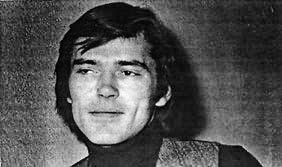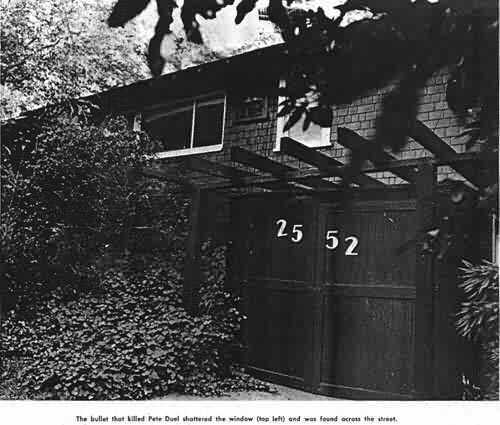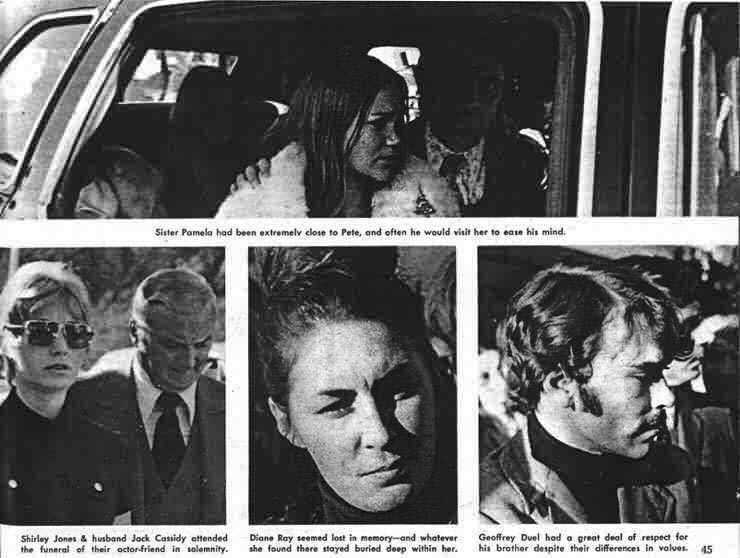- EXCLUSIVE! THE TRUE STORY BEHIND PETE
DUEL'S DEATH
by Richard Morris
Motion Picture magazine, April 1972
 Peter
Ellstrom Duel died the same way he had acted--with passion and
precision and in the shadow of his grim, stubborn judgment. He
turned his back on a life that he'd found inadequate as an alternative
to death. It was fitting--tragically fitting--that he'd gained
fame as the star of a television series called ALIAS SMITH AND
JONES, because Peter Duel was an alias in real life, too. In
his 31 years on this earth, he had never been able to find himself.
Changing his last name from Deuel to Duel hadn't helped much.
Peter
Ellstrom Duel died the same way he had acted--with passion and
precision and in the shadow of his grim, stubborn judgment. He
turned his back on a life that he'd found inadequate as an alternative
to death. It was fitting--tragically fitting--that he'd gained
fame as the star of a television series called ALIAS SMITH AND
JONES, because Peter Duel was an alias in real life, too. In
his 31 years on this earth, he had never been able to find himself.
Changing his last name from Deuel to Duel hadn't helped much.
The past holds many clues to Peter's destruction,
the seemingly self-inflicted death that stilled his body on December
31, 1971, when a .38 caliber revolver's speeding bullet tore its
way through his brain and emerged, blood-flecked, to shatter the
street window after passing through him. And it also helps to
explain why Peter was so alone when it all happened, why he only
had his girlfriend, his anger and his gun for company on the night
before New Year's Eve, one of the most sociable and joyous times
of the year. In a strange and sorry sense, his death had been
a long time coming.
Peter Duel's bleak and brief life began
when he was born to Dr. Ellsworth S. Deuel and Lillian Ellstrom
Deuel in Rochester, New York, on February 24, 1940. His family
had produced three generations of doctors, but Peter had rebelled
at the thought of a medical future or any future in which he would
lose his identify to gain professionalism. At an early age, and
in a dignified way, he made it perfectly clear that he wanted
to be the sole determiner of his fate.
"I chose the line of least resistance
in choosing my career," Peter admitted later. "I just
fell into something I love--the only thing I ever really like
doing. There's something that happens to me when I'm working in
front of a live audience...an excitement forms in the pit of my
stomach."
Unfortunately, his acting career became
locked into television (LOVE ON A ROOFTOP, ALIAS SMITH AND JONES
and numerous guest spots), and the video screen was only a pale
ghost next to Peter's theatrical aspirations. Shortly before his
death, he had wearily complained that "a television series
is a big, fat drag to any actor who is really interested in his
work."
Love was just as elusive as peace. Peter
was linked with actress Jill Andre, Judy Carne, and, most lastingly,
with Diane Ray. He and Diane seemed to be headed for something
more permanent, more stable than anything previous in his life.
It was her influence that made him move into a new home, learn
to enjoy himself, reach but for the love he so desperately needed
to offset his lethargy and fear.
MOTION PICTURE had run an earlier story
on Peter in September, 1971, and it has sadly proven to be the
truth. Titled HE CARRIES THE WORLD ON HIS SHOULDERS, the first
page showed a stern-faced photo of him with Diane, the blurb next
to which read: "Things bother me too much...war, pollution,
prejudice. I can't smile." And underneath the photo was the
simply-worded caption: "Diane Ray is the magic that keeps
Pete's life sorted out." The only question one can ask is:
what made the magic fail?
From the report issued by the Los Angeles
Police Department, it appears as if time alone was the victim's
executioner.
"You wouldn't believe the mail I'm
getting," Detective Sergeant Paul Estrada, who has been assigned
to the case, confided to our reporter. "I've been hearing
from high school girls all around the country who want to take
over the investigation." And he added in grotesque understatement,
"They don't believe there was anything in the world that
would make Pete Duel want to shoot himself--but actually he had
quite a bit on his mind."
Our representative asked Estrada to reconstruct
Peter's final evening. Here is a summary of the official police
record:
On the evening of December 30, 1971, at
approximately 7:50 p.m., Harold Frizzell (Duel's actor stand-in
and "man Friday") swung his car into the driveway of
the late actor's home at 2552 Glen Green Street. As usual, Duel
was with him, and both men vacated the car and walked into the
house. (Editor's Note: Since his conviction on drunken driving
charges on October 24, 1970, Duel's license had been indefinitely
suspended. It was usual for a friend to drive him to and from
the studio and to transport him at other times whenever possible.)
Diane Ray, had her own key to the house and had let herself in
upon her earlier arrival at 7:30 p.m.
The three of them sat around inside and
watched ALIAS SMITH AND JONES on Duel's portable television set.
At approximately 9:00 p.m., Frizzell left the house. It had been
a peaceful visit; though Duel hadn't carried on a lively conversation,
he had not appeared to Frizzell to be either sullen or despondent.
As soon as Frizzell had left, Duel changed
channels to a basketball game. He sat watching it alone for a
few minutes, then picked himself up and walked into the bedroom.
When he left the bedroom (time lapse undetermined at this report),
Miss Ray caught sight of him while she stood in the hallway of an adjoining room. He was
carrying a .38 revolver in his hand.
of an adjoining room. He was
carrying a .38 revolver in his hand.
"I'll see you later," Duel told
her. He disappeared into the living room.
At approximately 12:10 a.m., a shot sounded
in the house. Miss Ray ran into the living room. Duel lay beneath
the Christmas tree, dead. By his side lay the .38 revolver.
A subsequent medical report revealed that
the bullet had completely torn through his head and had also shattered
a front window, eventually landing in a carport across the street.
It has not been indisputably proven that
Duel's death was self-inflicted, but, as Detective Estrada puts
it, "It is doubtful that somebody else could get that close
to him while he was standing there and put a gun to his ear."
(And the crime lab report has undeniably endorsed the belief that
the gun muzzle had been less than an inch from his ear when it
was fired.)
One thing, though, does disturb the police.
"The autopsy showed that Duel had consumed a lot of alcohol
just prior to the shooting," Detective Estrada pointed out.
"I can't give you the exact figures on the blood test, but
I can tell you they were pretty extreme." But according to
the testimony of Allan Cahan, unit publicist for ALIAS SMITH AND
JONES, Duel had not been in a bad mood over the holiday week,
"I spent Christmas Day with him," he recalled. "Pete
was in fine spirits."
Two facts sharply contrast with the general
contention of friends that Duel had been in relatively good spirits:
A) At the time of the search, carried
on in his home on the night of his death, a second bullet had
been found--a bullet that was about one week old. It appeared
as if the late actor had fired it at a telegram that was framed
and hung in the hallway. It was a telegram announcing his defeat
in an election to the board of directors of the Screen Actors
Guild.
B) It is a well-known fact that Duel was
depressed about his drinking problem--and that he was managing
to stay off the bottle. Something very stressful must have occurred
within those last few hours which finally culminated in the pulling
of the trigger.
Diane Ray has not alluded to their having
had any sort of argument on the fatal evening. In fact, no one
could figure out just what had depressed him so--even those who
were closest to him. They eventually agreed that the cause was
his general nature, the personality that had dominated his actions
throughout his life. Thus, in a very dark and dismal summation:
Peter Duel died the way he did because his whole life had been
geared to it. It seemed inevitable that he would someday take
his own life. And--whether you'd like to believe it or not--if
Duel had not committed suicide on December 31st, he probably would
have done it at some later date.
Sounds scary? Even farfetched? Then consider
what Pete said in 1967.
"My father took great pains to get
me ready for college. But I had been watching the world and I
didn't see one thing in my future that I really wanted. Everything
seemed phony. I was down, terribly depressed. I knew that if I
went to college I'd be educated like every other guy who ever
went to college. I'd be given little chance to become Peter Duel...."
"That's when I decided to commit
suicide. I thought about it a long time. I felt useless. I was
ambitious for nothing. I kept feeling I was on the wrong track
and would never get off. I didn't know what was going to happen
to me if I died, but it seemed the only sensible thing to do.
Then I discovered there was one thing I didn't have--the guts
to take my own life. So, in truth, I just chickened out and after
awhile the urge went away."
And it is probable that the urge had returned
prior to his death. Peter fought it off, desperately trying to
use his girl, his acting and his friends as antidotes to the poison
of hopeless that grew through the years like a cancer inside of
him. But, as with many cases of cancer, it proved just a little
too subtle, too complex, too stubborn to remove. Finally, he was
just too tired to fight any longer. So on that fateful night of
December 31st at 10 minutes past midnight, Peter Duel sighed one
final sigh of resignation and regret and carried out the life-long
decision he hadn't: the "guts" to execute at the age
of 16 in Rochester, New York.
In his own words, acting was something
he loved, "the only thing I ever really liked doing."
And although it's almost certain that Peter Duel has made it to
heaven, it's a pity and an irony that he could never find enough
reason to stay on earth.


Back
to Articles List
 Peter
Ellstrom Duel died the same way he had acted--with passion and
precision and in the shadow of his grim, stubborn judgment. He
turned his back on a life that he'd found inadequate as an alternative
to death. It was fitting--tragically fitting--that he'd gained
fame as the star of a television series called ALIAS SMITH AND
JONES, because Peter Duel was an alias in real life, too. In
his 31 years on this earth, he had never been able to find himself.
Changing his last name from Deuel to Duel hadn't helped much.
Peter
Ellstrom Duel died the same way he had acted--with passion and
precision and in the shadow of his grim, stubborn judgment. He
turned his back on a life that he'd found inadequate as an alternative
to death. It was fitting--tragically fitting--that he'd gained
fame as the star of a television series called ALIAS SMITH AND
JONES, because Peter Duel was an alias in real life, too. In
his 31 years on this earth, he had never been able to find himself.
Changing his last name from Deuel to Duel hadn't helped much.
 of an adjoining room. He was
carrying a .38 revolver in his hand.
of an adjoining room. He was
carrying a .38 revolver in his hand.
